
Greasy hair —I hate it. And yet I'm plagued by it. Greasy hair has been my constant companion for as long as I can remember. I'm pretty sure that it really kicked in when puberty hit and my hormones were on overdrive.
I could easily wash my hair every day, but try not to because my ends are also super dry and I feel like my hair needs a break. So I wash every other day with the best shampoo instead, and arm myself with one of the best dry shampoos for the days in between.
I wanted to find out more about what causes my greasy hair and if there's anything that I can do to alleviate the issue. So I spoke with hair-supremo Anabel Kingsley, a trichologist from the Philip Kingsley clinic, and Skye Edwards, artistic director at Gielly Green, who revealed all...
What causes greasy hair?
"People with naturally fine hair tend to get greasy hair faster than those with other hair textures," explains Kingsley. "This is because individuals with fine hair have more hairs per square centimetre - and each hair has a sebaceous (oil) gland attached to it. As a result, the scalp produces more oils."
Those with thinning hair are also more prone to getting greasy hair. This is because there is reduced surface area of hair for the oils produced by the scalp to spread over.
The grease you see on your hair and scalp is mainly sebum – an oily substance produced by sebaceous glands. The main components of this are fat and cellular debris. However, this ‘grease’ will also consist of sweat, dead skin cells and environmental pollution (i.e. dust and dirt).
How can you prevent greasy hair?
Choose the correct shampoo and conditioner
To prevent the hair from getting greasy, Edwards explains that it's important to use the correct shampoo and conditioner. "Fine hair needs a lighter shampoo that's not too heavy, look for a volume shampoo or an everyday shampoo. Thicker hair can be drier and need more moisture, so look for a hydrating or moisturising shampoo. If your hair is more greasy then an oily, clarifying or purifying shampoo will be best."
Why not check out our edit of the best shampoo for greasy hair while you're here.
Use a dry shampoo with scalp benefits
"To help soak up excess oils, and to calm itching between shampoos, use a dry shampoo with scalp benefits," says Kingsley. "We have a very lightweight dry shampoo that contains Zinc PCA, Allantoin and Bisabolol, all of which help to soothe the scalp."
Exfoliate the scalp
"You can also use a daily scalp toner after shampooing and an exfoliating scalp mask once a week to help regulate oil production and prevent build up," says Kingsley. "Our Scalp Toner contains Witch Hazel to help soak up excess oil, as well as anti-microbial and anti-inflammatory ingredients, and our Exfoliating Scalp Mask removes dead skin cells and helps keep your scalp in optimal condition. Again, Zinc is an excellent ingredient to look for as it helps to control sebum (oil) production."
Don't apply conditioner too close to the roots
Kingsley says to avoid applying conditioner too close to the roots, as this is one of the most common causes of lank and dull looking hair. "Only apply it to the mid-lengths and ends where the hair is older and needs moisture the most."
Avoid running your hands through your hair
I don't know about you, but I'm always running my hands through my hair during the day. However, it turns out that this could be contributing to the problem. "To help prevent your hair from getting greasy, try not to run your hands through your hair too often, you'll just be adding the natural oils from your fingers or dirt to your hair," explains Edwards.
Why do some people suddenly develop greasy hair?
If you find that your hair has suddenly started to feel more greasy than usual, it could be to do with your hormones.
"Whenever hormone levels change, scalp secretions can change too," says Kingsley. "The scalp usually becomes oilier during puberty, in times of intense stress and also during ovulation. Medical conditions such as Polycystic Ovarian Syndrome can also cause an overly oily scalp. However, PCOS will almost always be accompanied by other symptoms, such as acne, weight gain, irregular periods and increased growth of facial and body hair. After menopause, sebaceous glands on the scalp tend to produce less sebum."
How often should someone with greasy hair wash their hair?
"Generally speaking, shampooing daily to every other day is ideal," says Kingsley. "It keeps the scalp clean and healthy, and in turn this supports hair growth. Frequent shampooing also removes daily grime and product debris from your hair. If washing your hair more means you are heat-styling more often, you may encounter problems with the condition of your hair. It is about finding a balance. As a general rule, do not leave more than three days between shampoos. However, if your roots are looking oily, it’s really best just to wash your hair. It doesn’t take long and you will be doing your hair a world of good. Hair grows best from a clean and healthy scalp."







